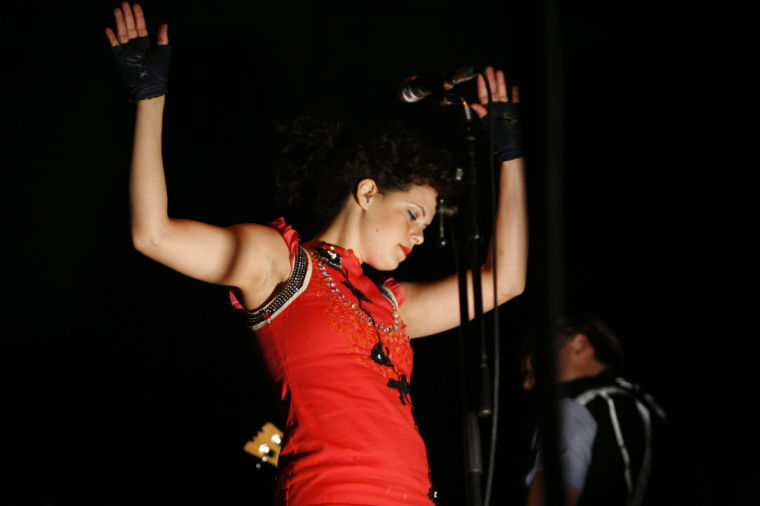
Arcade Fire’s Régine Chassagne
Arcade Fire is danceable now. While past albums weren’t particularly well-suited to scoring anything more energetic than a Sunday afternoon sob session or the intro to an NPR story about world hunger, Reflektor could easily serve as the soundtrack to a pretty solid dance party. With influences as diverse as Michael Jackson and Fela Kuti, it’s an unexpectedly — and successfully — groovy album from a band usually more concerned with melodies than beats.
Produced by ex-LCD Soundsystem frontman James Murphy — whose music has already facilitated more than a few dance-offs — the album draws on disco, Afrobeat, electronica and good old-fashioned rock ‘n’ roll to create a unique yet universal sound that aims to sound like the sum of humanity’s dance music. Call it cultural appropriation if you like, it’s still gonna get your foot tapping.
There’s a kitchen-sink quality to Arcade Fire’s approach, (“Let’s throw the Pixies and the Bee Gees together and see if it works!”) but it pays off remarkably well, with a few exceptions. The band still can’t do straight-up rock ‘n’ roll. Win Butler and company are too Canadian to rock — it’s impossible to imagine them blasting The Ramones without apologizing to the neighbors afterwards.
“Normal Person,” Reflektor’s token headbanger — besides featuring lyrics a teenage Kurt Cobain would have thrown away for being a tad too obvious — is like an alien’s approximation of what rock is supposed to sound like. The angry guitars and banging drums are there, but something essential is missing. It’s the equivalent of throwing eggs and flour in a bowl and calling it cake. You need to apply some heat, dude.
So, no, Arcade Fire is not rockin’. But, surprisingly, it is bumpin’. It’s an album of shimmying beats halfway between ’80s disco and something from the Black Orpheus soundtrack. (Scenes from the 1959 film accompanied the lyric video the band premiered shortly before the album’s release.) If Bad-era Quincy Jones was made grand marshal of a Haitian street parade, it might sound something like this.
Although the band’s sound could hardly be called minimalist, it has trimmed away much of its indie excess — gone are the accordions and sweeping orchestral instrumentations of Funeral. (There is, however, a chorus of cooing French girls on “Joan of Arc.”) Rara banger “Here Comes the Night Time” needs little more than a bass and what sounds like a vuvuzela to create a groove that could make even the back of a minivan feel like Mardi Gras.
Even the album’s gloomiest tracks, the sadgirl/sadboy one-two punch of “Awful Sound (Oh Eurydice)” and “It’s Never Over (Hey Orpheus),” are kind of funky. And that’s what makes Reflektor Arcade Fire’s best album: It retains the band’s knack for soaring, symphonic emotion while finally tethering it to something firm and tangible. Listen to “Wake Up,” “No Cars Go,” “Sprawl II (Mountains Beyond Mountains)” and Reflektor’s title track and you can hear the band honing its sound to a razor edge.
It is, in many ways, a bleak album, filled with apocalyptic lyrics about death and doomed lovers, but the album is defined by its sense of resilience as much as its sense of doom. It’s an album by and for people who know the end is coming but are determined to make the most of the last few moments they have. There’s a refusal to submit to death, a feeling that there will be joy as long as there is air to breathe, that, in the album’s best moments, borders on — dare I say it? — transcendence.
We’re all gonna die. Who wants to dance?



